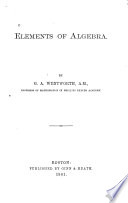 | George Albert Wentworth - Algebra - 1881 - 400 pages
...From this it follows that log — = log 1 — log m. But, since log 1 = 0, log - = — log m. III. The logarithm of a power of a number is equal to the...the number multiplied by the exponent of the power. For, let x be the logarithm of m. Then m = an, and mP = (an)p = of. .-.log mi> = px, IV. The logarithm... | |
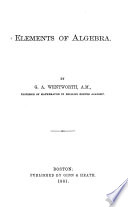 | George Albert Wentworth - Algebra - 1881 - 406 pages
...exponents (§ 294), therefore, when roots are expressed by fractional indices, The logarithm of a root of a number is equal to the logarithm of the number multiplied by the index of the root. Thus, log 2* = \ oflog 2 = \ x 0.3010 = 0.0753. log .002* = } of (7.3010 - 10).... | |
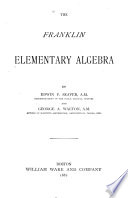 | Edwin Pliny Seaver, George Augustus Walton - Algebra - 1881 - 304 pages
...the m lb power, N ™ = &™* whence it appears (Art. 384) that mx is the logarithm of N m . Hence The logarithm of a power of a number is equal to the...the number multiplied by the exponent of the power. 394. To find the logarithm of a root. Let N=b*. Taking the n" root, i/N= b", whence it appears (Art.... | |
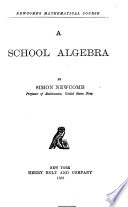 | Simon Newcomb - Algebra - 1882 - 302 pages
...Hence, by definition, A — k = los—, 9 or log p — log q = log—. THEOREM IX. The logarithm of any power of a number is equal to the logarithm of the number multiplied by the exponent of the power. • Proof. Let h = log p, and let n be the exponent. Then 10* — p. Raising both sides to the иth... | |
 | Henry Nathan Wheeler - Logarithms - 1882 - 60 pages
...Iogw123 = 2.0899 ; what is Iog100.123?_ Ans. 2.0899-3 = 1.0899. § 8. In any system the logarithm of any power of a number is equal to the logarithm of the number multiplied by the exponent of the power. Proof: If I = 6х, then is log6Z = ж, lm = (b*)"1 = b™ ; .•. logZ** = mx = mx log Z. Under this... | |
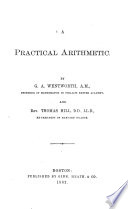 | George Albert Wentworth, Thomas Hill - Arithmetic - 1882 - 376 pages
...0.4771 = 5.2481. 413. As logarithms are simply exponents, therefore (§381), The logarithm of a root of a number is equal to the logarithm of the number multiplied by the index of the root. Thus, log 2J = | of log 2 = } X 0.3010 = 0.0753. log .002* = J of (7.3010 - 10).... | |
 | Benjamin Greenleaf - 1883 - 344 pages
...and dividing, member by member, we have in which x — y = log,, I — 1. 360. The logarithm of any power of a number is equal to the logarithm of the number, midtiplied by the exponent of the power. For, assume the equation, <zc = m, and raising both members... | |
 | Stephen Roper - Mechanical engineering - 1884 - 740 pages
...power of a given number may be found by logarithms as follows : The logarithm of any power of a given number is equal to the logarithm of the number multiplied by the exponent of the power. Example.— To find the fifth power of 9, logarithm 9 = 0'954243 X 5 = 4-771215, and the number corresponding... | |
 | Simon Newcomb - Algebra - 1884 - 572 pages
...— k = log-^, or log p — log q = log -• IX. THEOREM. Tfie logarithm of any power of a nujnber is equal to the logarithm, of the number multiplied by the exponent of the power. Proof. Let h = log p, and let n be the exponent. Then 0* = p. Raising both sides to the n^ power, Whence... | |
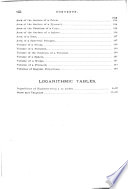 | Charles Davies, Adrien Marie Legendre - Geometry - 1885 - 538 pages
...denoted by p, we have, 10*" = mfwhence, by the definition, xp = logm". (8.) That is, the logarithm of any power of a number is equal to the logarithm of the number multiplied by the exponent of the power. 8. Extracting the root, indicated by r, of both members of (4), we have whence, by the definition,... | |
| |